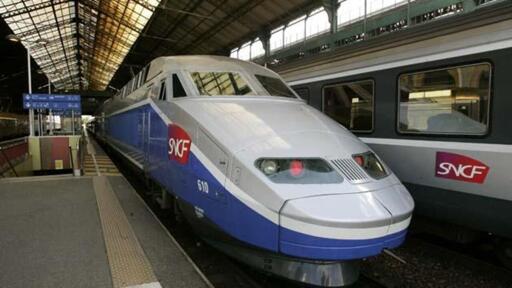A new high-speed train service linking Paris and Berlin was launched on Monday – just in time for the Christmas travel season. Joint operators SNCF and Deutsche Bahn say they hope passengers will see it as a “greener” alternative to flying.
It’ll be greener. It’ll also be twice as expensive.
Seats went on sale in October, with fares starting from €59 for a one-way second-class ticket and €69 for first class.
Not too bad for a change.
The journey is still 8 hours, which won’t compete with air travel except for those motivated by other criteria such as sustainability or a fondness for railways. Build a Shinkansen-class line joining the two cities and you could halve that time, making taking the train a lot more compelling to the average person.
Also, air travel is going to have a price advantage as long as jet fuel is tax free. This policy, instituted after WW2 to nurture the then new aviation sector, has long outlived its usefulness and should be scrapped, with tax advantages going to more sustainable transport if anything. Though in practice it is hard changing any policy, however absurd, that powerful incumbents benefit from.
Yep, 150km/h on average is not that great. Especially considering the average in the part of the route in France (tbf, without a stop) is around 280km/h. Leaving an average of 130km/h through Germany.
But still nice that there are long-distance direct connections, as changing can be a major pain, especially with DB…
Changing trains is by far one of the biggest problems with the DB. I’m fine with arriving later, but if I am unlucky and miss the last train and have to wait till like 4am to get the next one I’m absolutely pissed.
Also going via Strasbourg is a massive detour. The direct connection would go through the northern bits of Luxembourg. However there is no track in the region allowing speeds above 130km/h in any of the four countries in that region.
Sure it’s a bit longer than air travel - but not as much as it sounds at first glance. People forget to include the time you have to spend in each airport, not to mention time getting to and from the airports whereas the train stations are both much closer to the city centers. Also not dealing with the hassles of air travel like baggies of toiletries and security checks is worth a lot to me.
I’d take 30min between CDG and Paris over 1h of DB just stopped in the middle of the tracks without explanation
Removed by mod
Well I wish I could argue that one but I haven’t had any good luck with DB for at least a year or two myself
It’ll be on time until it reaches the German border
Lmao… enter Deutsche Bahn. You will never arrive on time. If you arrive at all.
Great news. I have done the previous 10-hour version of this route several times. 8 hours is still far too slow and it’s due to Germany’s lack of high-speed infrastructure. Still, there are plenty of conscientious types in both France and Germany who will be ready to make the sacrifice. Personally I hate sleeper trains but have no problem sitting in comfort for a whole day so I would definitely use this service.
It’s easy to forget that in terms of one’s personal carbon footprint, flying is an absolute disaster. Basically for any distance: the exponentiality of wind resistance means that going really fast will always be extremely inefficient. This is why I find America’s situation sad. You guys have so few alternatives, yet every time you hop on a plane you are basically blowing your carbon quota for the whole year. Time to step up the fight for proper rail investment.
It shouldn’t be legal to fly from Berlin to Paris.
France has already made short national flights illegal. Once we have high speed rail alternatives, the flights should be forced to stop
if multi leg flights allowed rail sefments I could agree.
8 hours vs 10, and even worse, surge pricing. So the busier it is, the more it costs. Stuff that. It’s just not real world attractive
Conversely, it’s cheaper if you’re flexible. Which poorer people generally are. I have no problem with yield-management pricing, In Europe it’s been incredibly successful at boosting low-cost air travel (unfortunately) and in recent years it’s finally doing the same thing for rail travel. Fixed prices make no sense.
Why would poorer people be more flexible? What’s that claim based on exactly?
The fact that they tend to have more time than money.
Seems you’re being triggered by the word but I mean it in a neutral sense. I’m sort of one of them myself.
No, a baseless claim always triggers me, especially if the person then responds with a personal attack instead of supporting their claim
Says enough haha
It hardly needs sourcing to assert that people with limited financial means tend to be more flexible when it comes to saving money. Again, I’m one of them myself. And I’ve neither attacked you personally nor even downvoted you. Anyway, enough.
What? Poor people are incredibly inflexible, working two jobs, juggling kids, zero hours contracts etc.
Fine, let’s stick with fixed fares then. Then poor passengers will have a choice of expensive packed trains or expensive empty trains, just like everyone else. Equality will be served.
PS. Yes, downvote away. Contrarianism and negativity do not actually produce solutions. Again: I myself could qualify as “poor”. I want more people to take the train instead of the plane, do you? The outdated fixed-fare system is stopping it from happening.
The outdated fixed-fare system is stopping it from happening.
Not sure if that helps poor people. I make a solid amount of money and am very flexible, as I can work just as well in the train as I could in the office. An assambly line worker surely cannot do that and likely has to travel on weekends when the prices are high (potentially higher than before).
Students, young people in general, part-time workers, unemployed, underemployed, I don’t have the statistics and obviously it depends on the country but these days there are a ton of people who have more time than money. Again, I am one of them.
Doubt. Rail in Europe will never compete with air travel unless there will be a Pan European rail system managed by one public company. At the moment there are just too many cooks and they all use their own tools and speak their own language.
rail system managed by one public company
So, like the expensive nationalized airlines until they were deregulated and suddenly became 5 times cheaper? What you are advocating, assuming it’s serious, is literally the opposite of the solution.
You can have a singular rail network system managed by one public company that is exploited by multiple private transport companies. The problem currently is that in Europe the rails are often also owned by the companies that use the rails and they don’t want to share. And the different networks often aren’t even connected to each other. If you take the high speed rail from France to Spain you need to get off near the border to take a slower train to cross the border and then you have to walk to a different platform to board the Spanish high speed train. Since the Spanish railway company and the French one don’t like each other. Not to mention that not every country uses standard-gauge.
There is no real competition between the different railway companies in Europe. Almost every route is monopolized by the owners of the different rail networks. While I can choose between different airlines for most routes. Put the rails under a separate pan European public company and force the transport companies to share the rails would solve this problem.
Didn’t realize you were referring to the track infrastructure only. Yes, sure, that obviously has always made sense. It’s a natural monopoly.









